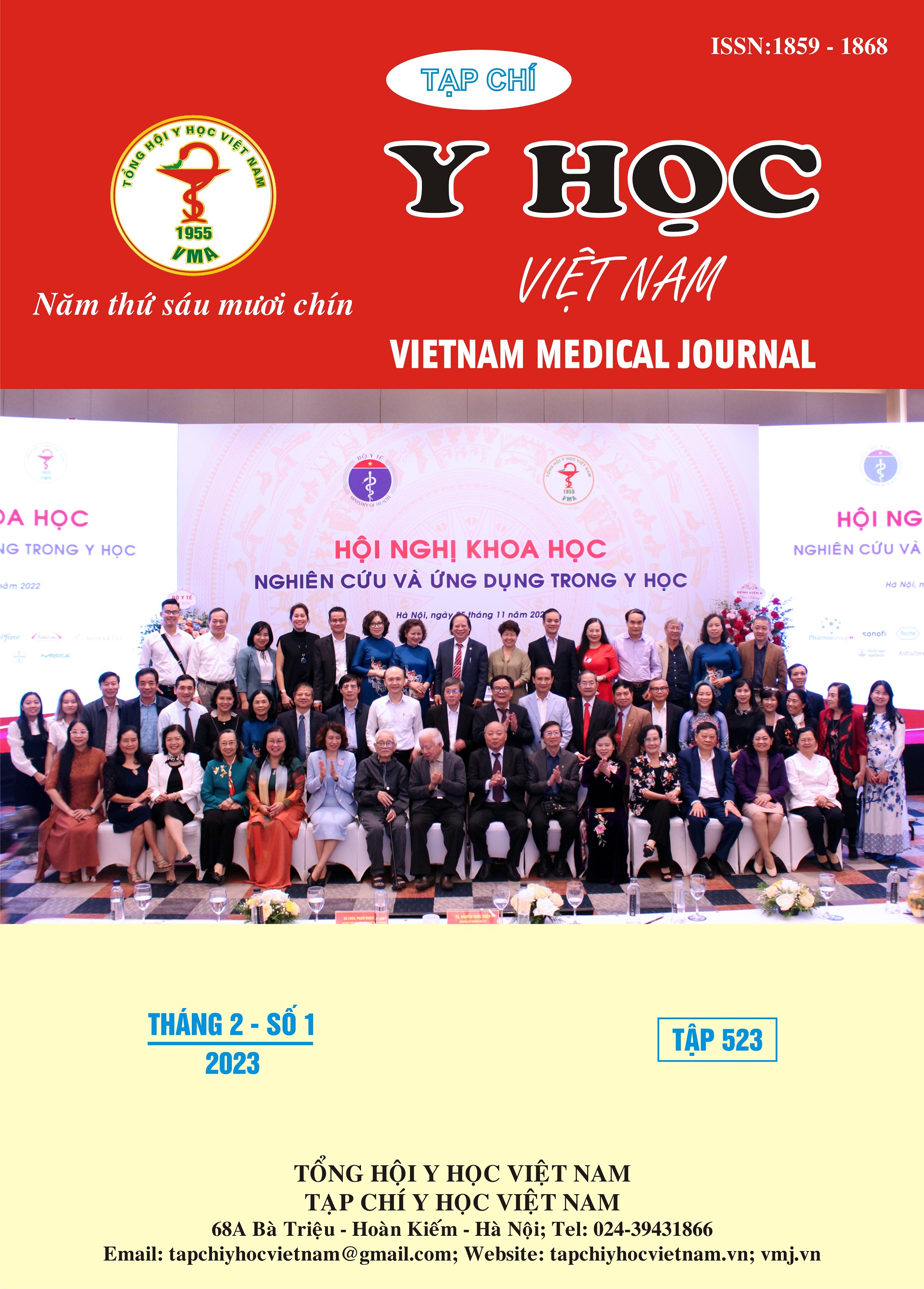ĐÁNH GIÁ THỜI GIAN SỐNG THÊM TOÀN BỘ CỦA BỆNH NHÂN UNG THƯ BIỂU MÔ TẾ BÀO GAN ĐƯỢC XẠ TRỊ TRONG CHỌN LỌC BẰNG HẠT VI CẦU PHÓNG XẠ RESIN Y-90
Nội dung chính của bài viết
Tóm tắt
Mục tiêu nghiên cứu: Đánh giá thời gian sống thêm toàn bộ của bệnh nhân được chẩn đoán xác định ung thư biểu mô tế bào gan điều trị bằng xạ trị trong chọn lọc với hạt vi cầu Resin gắn Y-90 và các yếu tố ảnh hưởng đến thời gian sống thêm tại Trung tâm Y học hạt nhân và Ung bướu thuộc Bệnh viện Bạch Mai. Đối tượng nghiên cứu: Nghiên cứu được tiến hành trên 111 bệnh nhân chẩn đoán HCC, điều trị bằng xạ trị trong chọn lọc từ 12/2013 đến 6/2022. Phương pháp nghiên cứu: hồi cứu có theo dõi dọc, can thiệp lâm sàng không đối chứng. Kết quả nghiên cứu: Thời gian OS trung vị là 25,9 tháng, khoảng CI 95% là 15,3 – 36,6 tháng. Tỷ lệ OS tại thời điểm 1 năm là 69,7%. Các yếu tố ảnh hưởng đến thời gian sống thêm toàn bộ bao gồm điểm toàn trạng ECOG 1, nồng độ AFP > 400ng/ml, kích thước u > 5cm, giai đoạn BCLC C và huyết khối tĩnh mạch cửa. Phân tích đa biến cho thấy huyết khối tĩnh mạch cửa là yếu tố ảnh hưởng đến sống thêm toàn bộ. Kết luận: Xạ trị trong chọn lọc bằng hạt vi cầu resin Y-90 là phương pháp điều trị hiệu quả cho bệnh nhân ung thư biểu mô tế bào gan giúp kéo dài thời gian sống thêm. Không có huyết khối tĩnh mạch cửa là yếu tố tiên lượng tốt cho thời gian sống thêm toàn bộ.
Chi tiết bài viết
Từ khóa
Ung thư biểu mô tế bào gan, thời gian sống thêm toàn bộ, hạt vi cầu phóng xạ resin Y-90, xạ trị trong chọn lọc
Tài liệu tham khảo
2. Benson AB, D’Angelica MI, Abbott DE, et al. Hepatobiliary cancers, version 2.2021, NCCN Clinical practice guidelines in oncology. J Natl Compr Canc Netw. 2021;19:541-565.
3. Salem R, Gordon AC, Mouli S, et al. Y90 radioembolization significantly prolongs time to progression compared with chemoembolization in patients with hepatocellular carcinoma. Gastroenterology. 2016;151:1155-63.e2.
4. Lewandowski RJ, Gabr A, Abouchaleh N, et al. Radiation segmentectomy: potential curative therapy for early hepatocellular carcinoma. Radiology. 2018;287:1050-1058.
5. Nguyen Van Thai, Nguyen Tien Thinh, Thai Doan Ky, et al. Efficacy and safety of selective internal radiation therapy with yttrium-90 for the treatment of unresectable hepatocellular carcinoma. BMC Gastroenterol. 2021;21: 216.
6. Salem R, Johnson GE, Kim E, et al. Yttrium-90 radioembolization for the treatment of solitary, unresectable HCC: the LEGACY study. Hepatology. 2021;74:2342-2352.
7. Saxena A, Meteling B, Kapoor J, et al. Yttrium-90 radioembolization is a safe and effective treatment for unresectable hepatocellular carcinoma: a single centre experience of 45 consecutive patients. . 2014; Int J Surg. 2014;12(12):1403-1408.
8. Rognoni C, Ciani O, Sommariva S, et al. Trans-arterial radioembolization in intermediate-advanced hepatocellular carcinoma: systematic review and meta-analyses. Oncotarget. 2016;7 (44):72343-72355.
9. Ozkan ZG, et al. Favorable survival time provided with radioembolization in epatocellular carcinoma patients with and without portal vein thrombosis. Cancer Biotherapy and Radiopharmaceuticals. 2015;30(3):132-138.
10. Salem R, Lewandowski RJ, Kulik L, et al. Radioembolization results in longer time-to-progression and reduced toxicity compared with chemoembolization in patients with hepatocellular carcinoma. Gastroenterology. 2011;140 (2):497-507.


